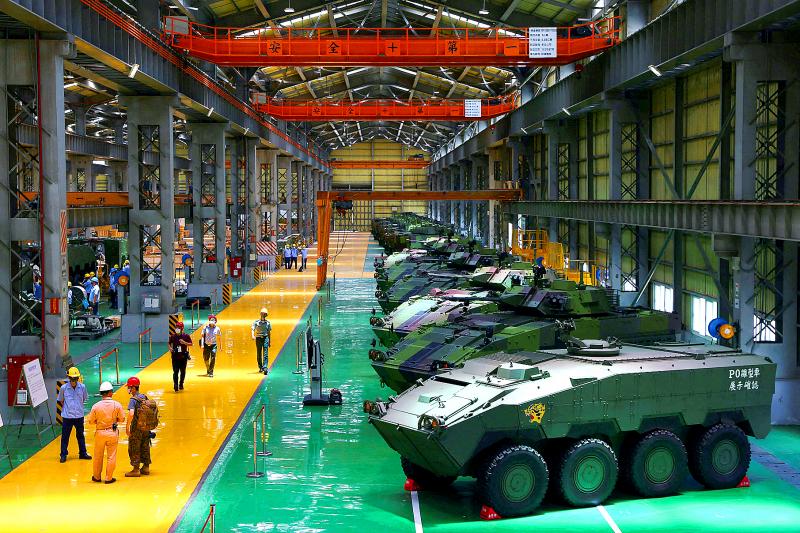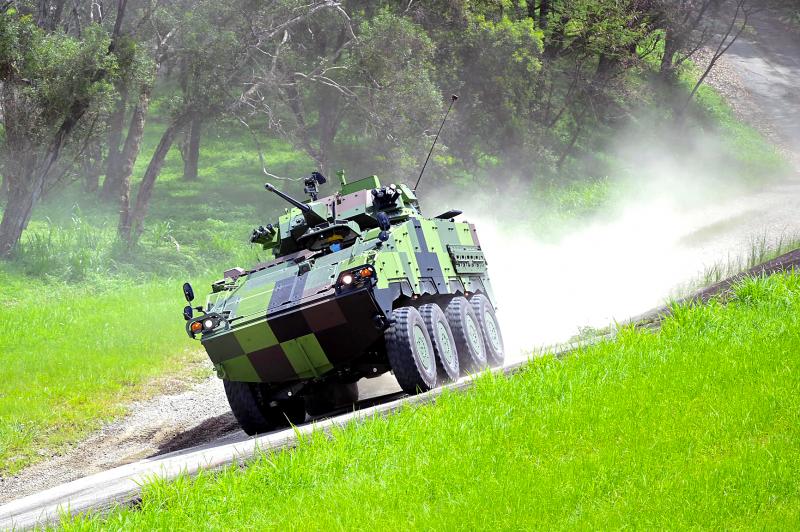The military yesterday showed off its latest domestically produced armored vehicle, the CM-34 Clouded Leopard, at a remote manufacturing site in the nation’s central mountains.
Taiwan has been eager to demonstrate its resolve to defend itself should China ever attack. Those fears have become more pronounced over the past few years as Beijing has stepped up military activities near Taiwan.
While Taiwan relies on the US for many of its weapons, such as fighter jets, President Tsai Ing-wen (蔡英文) has been pushing for a greater emphasis on Taiwanese-designed and made armaments, the most high profile of which is new submarines.

Photo: Ann Wang, Reuters
The eight-wheeled CM-34, which entered service in 2019, is armed with a Mk44 Bushmaster 30mm chain gun made by Northrop Grumman and has an effective firing range of 3km. It is designed to be highly mobile and operate in all weather.
The plant in Nantou County’s Jiji Township (集集) can produce six vehicles per month, and has delivered 173 to the military out of an order for 305, said Wang Wen-hung (王文宏), head of the facility.
The vehicle is named after Taiwan’s clouded leopard. Although believed to be extinct, the animal is revered by some indigenous communities who consider it to be sacred.

Photo: Sam Yeh, AFP
The development of the vehicle has not been without problems. Last year, several senior executives of supplier companies were jailed for fraud for procuring substandard parts, including some from China, for an earlier model, the CM-32.

NATIONAL SECURITY THREAT: An official said that Guan Guan’s comments had gone beyond the threshold of free speech, as she advocated for the destruction of the ROC China-born media influencer Guan Guan’s (關關) residency permit has been revoked for repeatedly posting pro-China content that threatens national security, the National Immigration Agency said yesterday. Guan Guan has said many controversial things in her videos posted to Douyin (抖音), including “the red flag will soon be painted all over Taiwan” and “Taiwan is an inseparable part of China,” while expressing hope for expedited “reunification.” The agency received multiple reports alleging that Guan Guan had advocated for armed reunification last year. After investigating, the agency last month issued a notice requiring her to appear and account for her actions. Guan Guan appeared as required,

Japan and the Philippines yesterday signed a defense pact that would allow the tax-free provision of ammunition, fuel, food and other necessities when their forces stage joint training to boost deterrence against China’s growing aggression in the region and to bolster their preparation for natural disasters. Japan has faced increasing political, trade and security tensions with China, which was angered by Japanese Prime Minister Sanae Takaichi’s remark that a Chinese attack on Taiwan would be a survival-threatening situation for Japan, triggering a military response. Japan and the Philippines have also had separate territorial conflicts with Beijing in the East and South China

A strong cold air mass is expected to arrive tonight, bringing a change in weather and a drop in temperature, the Central Weather Administration (CWA) said. The coldest time would be early on Thursday morning, with temperatures in some areas dipping as low as 8°C, it said. Daytime highs yesterday were 22°C to 24°C in northern and eastern Taiwan, and about 25°C to 28°C in the central and southern regions, it said. However, nighttime lows would dip to about 15°C to 16°C in central and northern Taiwan as well as the northeast, and 17°C to 19°C elsewhere, it said. Tropical Storm Nokaen, currently

PAPERS, PLEASE: The gang exploited the high value of the passports, selling them at inflated prices to Chinese buyers, who would treat them as ‘invisibility cloaks’ The Yilan District Court has handed four members of a syndicate prison terms ranging from one year and two months to two years and two months for their involvement in a scheme to purchase Taiwanese passports and resell them abroad at a massive markup. A Chinese human smuggling syndicate purchased Taiwanese passports through local criminal networks, exploiting the passports’ visa-free travel privileges to turn a profit of more than 20 times the original price, the court said. Such criminal organizations enable people to impersonate Taiwanese when entering and exiting Taiwan and other countries, undermining social order and the credibility of the nation’s